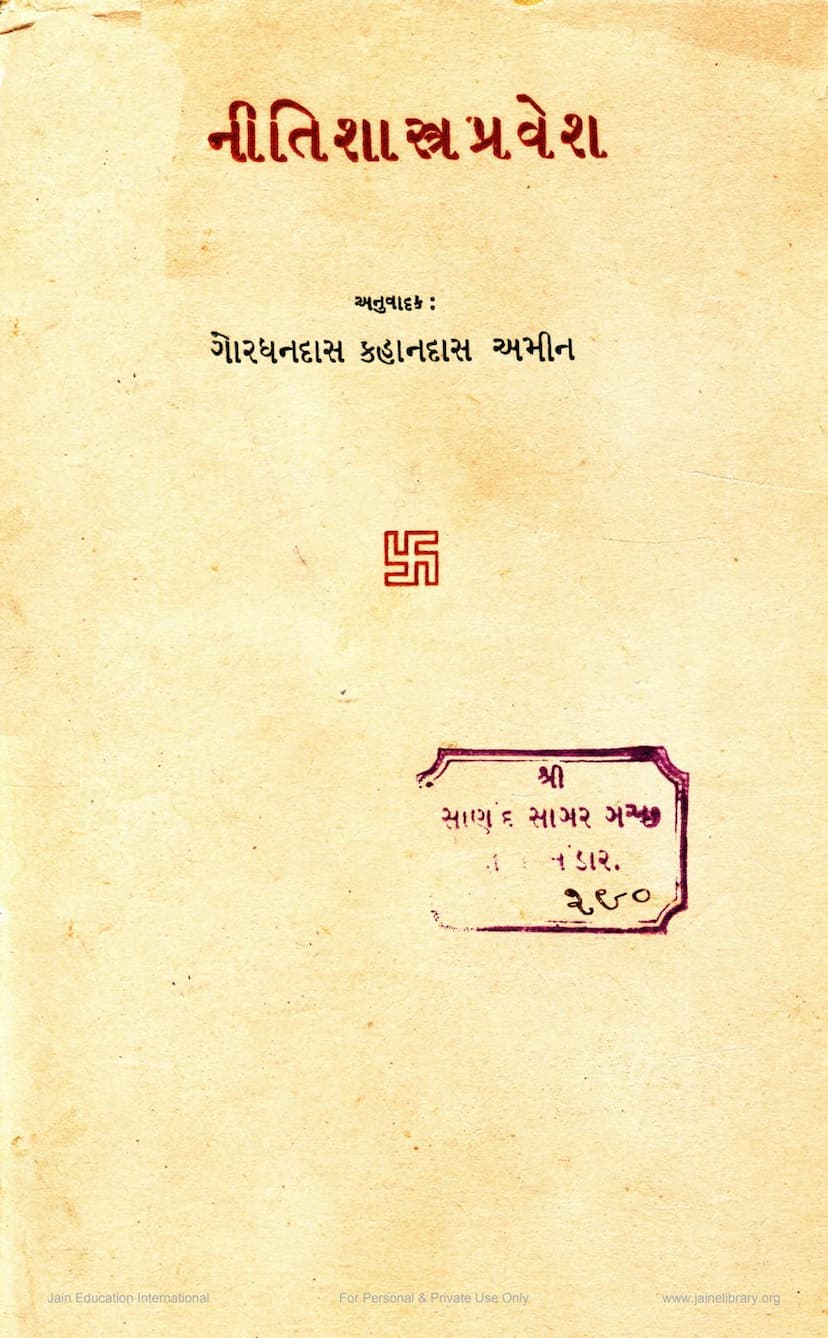Nitishastra Pravesh
Added to library: September 2, 2025

Summary
Certainly! Here is a comprehensive summary of the Jain text "Nitishastra Pravesh" based on the provided pages, focusing on its content and key themes:
Book Title: Nitishastra Pravesh (Introduction to Ethics) Author: Gordhandas Kahandas Amin (Translator) Publisher: Gurjar Granthratna Karyalay, Ahmedabad
Overall Summary:
"Nitishastra Pravesh" is an introductory text on ethics, presented as a translation from Marathi, with a preface and introduction by prominent figures in Gujarati literature, including Kaka Kalelkar and Manilal Sankhanchand Gandhi. The book aims to provide readers with a new perspective on ethical principles, contributing to a deeper understanding of morality and its application in life.
Key Themes and Content Breakdown:
-
Purpose and Vision:
- The book is part of the "Sw. Gandhi Sankhanchand Narsinhdas Smarakmala," initiated to honor the values of honesty and self-reliance.
- The aim is to provide useful and guiding literature to society, offering a fresh perspective on ethical and societal issues.
- The translation is undertaken despite potential financial challenges in publishing such philosophical works, driven by the translator's conviction in the subject's importance.
-
The Nature of Ethics and Morality:
- The text delves into the fundamental questions of what constitutes ethics, exploring the relationship between ethics (Nitishastra) and other disciplines like Dharma (Religious Duty/Law), Rajneeti (Politics), and Arthashastra (Economics).
- It discusses how ethics is not separate from daily life, but rather permeates all aspects, from personal conduct to societal well-being and political decisions.
- A key point is made that while Dharma encompasses a broader spectrum of life, Nitishastra focuses on the analysis of ethical principles, questioning "why" certain actions are considered moral and why specific behaviors are labeled as virtuous.
-
Critique of Traditional Notions:
- The text challenges the idea that ethics should be solely derived from scripture or the pronouncements of sages and saints. It advocates for an approach grounded in intellect, reasoning, and logical testing, emphasizing individual autonomy in understanding morality.
- It distinguishes between "Nitishastra Shikshan" (teaching ethics) through conduct, association, and etiquette, and "Nitishastra Mimansa" (analysis of ethics), which encourages critical questioning of customs and traditions. The latter is seen as vital for intellectual growth and personal freedom.
-
The Role of Reason and Intellect:
- The book emphasizes the importance of using intellect and logic to understand ethical principles. It critiques blind adherence to tradition or scriptural injunctions without critical examination.
- The author, Vaman Malhar Joshi (original author of the Marathi work), is praised for his comprehensive and scholarly analysis, employing Western methods of critique while integrating Indian ethical concepts.
-
The Interconnectedness of Disciplines:
- The text suggests that ethics is closely linked to economics and politics. For example, the economic pursuit of wealth should be guided by ethical principles to ensure it benefits society rather than leading to exploitation. Political decisions must also align with ethical considerations for the welfare of the people.
-
The Distinction Between Education and Analysis:
- The book differentiates between the 'teaching' of ethics (through examples, discipline, and adherence to rules) and the 'analysis' of ethics (through critical thinking, reasoning, and understanding the 'why' behind moral principles). It champions the latter for intellectual and spiritual development.
-
The Concept of "Good" and "Bad":
- The text explores the subjective and objective nature of ethical judgments, discussing how the perception of "good" and "bad" can vary based on individual reasoning, societal norms, and even circumstances. It emphasizes that the ultimate judgment rests on one's own conscience and rational capacity.
-
The Nature of Knowledge and Action:
- It highlights that knowledge itself is not sufficient for ethical conduct. The translation emphasizes the importance of applying knowledge through action and self-discipline. The author praises thinkers whose writings provide new perspectives and aid in clarifying one's own vision.
-
The Translator's Contribution:
- Gordhandas Kahandas Amin's translation is noted for its faithfulness to the original author's style, nuance, and even humor, making the philosophical concepts accessible to Gujarati readers.
-
Endorsements and Support:
- The book is praised for its comprehensive treatment of ethics, comparable to Western scholarly works on the subject.
- The preface by Manilal Sankhanchand Gandhi highlights the value of the book in providing a new perspective and acknowledges the contributions of the publisher and the author of the preface (Kakasaheb Kalelkar).
In essence, "Nitishastra Pravesh" serves as a philosophical discourse on ethics, advocating for a reasoned, analytical, and introspective approach to understanding and practicing morality. It bridges traditional Indian thought with modern philosophical inquiry, making it a valuable read for anyone seeking to deepen their understanding of ethical principles and their relevance in contemporary life.